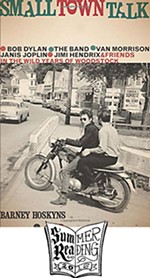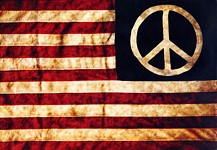Letters at 3AM
A Paperback at Woodstock
By Michael Ventura, Fri., July 17, 2009
Rereading a beat-up paperback, the cover long since torn and taped, a date on the first page, written in my hand, evoked a different summer: 7/12/69. Two weeks after Stonewall. Eight days before men walked on the moon. About a month before Woodstock.
It's a slow read, Brooks Adams' The Law of Civilization and Decay (1896, American edition), written for people better educated than any today. So I must, at 63, as I did at 23, slog through Adams' myriad references to events and names of which I'm ignorant and go for his gist, astonishingly contemporary, as in his summary of American society more than a century ago:
"Although the conventions of popular government are still preserved, capital is at least as absolute as under the Caesars, and, among capitalists, the money-lenders form an aristocracy. Debtors are in reality powerless, because of the extension of that very system of credit which they invented to satisfy their needs. Although the volume of credit is gigantic, the basis on which it rests is so narrow that it may be manipulated by a handful of men."
In prose aglitter with now unfamiliar usages, Brooks Adams – great-grandson of John Adams – presented a vision of history from ancient times to his own. His conclusions: Eventually, the power of the West will decrease as the power of Asia (especially China) increases; power always concentrates where capital is most plentiful and production most efficient; when any centralized polity reaches its apex, it begins to disintegrate; all societies oscillate helplessly between periods of centralization and decentralization. Wrote Adams, "Another conclusion forced upon my mind, by the examination of long periods of history, was the exceedingly small part played by conscious thought in moulding the fate of men."
A fantastically instructive work. Studied it most of that summer of '69. My habit was to carry reading matter everywhere, so it was probably in my gear when Duke and I lit out for Woodstock, though I did no reading there.
By the wee hours of Saturday, Aug. 16, radio reports made it clear that Woodstock was, well, Woodstock. Duke said, "They'll talk about this for the rest of our lives. Let's go." A drive of 100 miles. We left New York City at maybe 2am. His small Saab easily weaved around the temporarily abandoned Detroit behemoths that littered Route 17B. We parked a short walk from the concert. That wide shot in the movie of half a million people on a slope that rose gradually to a height maybe twice that of the stage – Duke and I reached the top of that slope just as the sun rose behind us and glittered upon Grace Slick's white outfit. "Wake up, America!"
Flash forward 40 years. Amazon zaps me a missive: Woodstock: 3 Days of Peace and Music: 40th Anniversary Ultimate Collector's Edition. I've often said if Michael Wadleigh hadn't made that film, folks now wouldn't believe us when we spoke of Woodstock. I ordered the box. It arrived ridiculously wrapped in imitation buckskin frill (to appeal to whom?).
Was it only 40 years ago? Brooks Adams might say the spectacle of Woodstock spans history. Its idealism was Victorian. Its pageantry was medieval. Its licentiousness was Roman. Its privation and faith of purpose were straight out of the Children's Crusade. Its living conditions were Neanderthal – but no, for only the civilized could peacefully accept sitting and sleeping in mud and the overflow of Porta Potties, as only the civilized can be herded into boxcars by soldiers whom they outnumber, and as only the civilized can be trained to be such soldiers. And only the civilized can produce such a variety and depth of music as was on that stage. Woodstock's pretense was that it represented rebellion against civilization; actually, it was a phenomenon of high civilization. All it lacked was civilization's unique capacity for savagery.
But that, too, was not entirely true. As an artist, I've always contended that, at our core, all artists are monsters. We'll do virtually anything to do what we do. In the best sense, then, savagery was on the stage, for it takes a dash of savagery to be truly free, and few are as truly free as artists in the throes and fits of their arts.
But artists do not create in isolation, however isolated we may feel. Artists, especially young artists, create in dialogue between their private spirit and the spirit of their time. A generation's aspirations, not its achievements, are expressed in its arts. A moment of high historical aspiration created the phenomenon and music of Woodstock. If the aspirations sung and spoken on Woodstock's stage seem naive now, it was a noble naivete. Most people there celebrated what they thought would be a resplendent flowering of culture and peace. Peace was a dream – a world at peace is not a human possibility, but the (comparative) liberation of women and gays, and a level of racial and ethnic tolerance unknown in history, is not a bad record for one generation, however much that generation dived wholeheartedly into the materialism that, for a short time, it protested.
Personally, I didn't have much fun at Woodstock. But lots of others did. They did all that I did not – took recreational drugs, walked naked, screwed, enjoyed being part of the mass, and, in the most profound sense, let themselves go. As a working-class Sicilian New York guy, averse to drugs, shy as well as reserved, helplessly intellectual – and valuing, too, the tough as well as the gentle – I stood apart, listened and watched, trying to figure what, if anything, Woodstock proved. I believed (and believe) that, as Brooks' brother Henry Adams wrote, history is "in essence chaotic and amoral" and would remain so, no matter what. Yet, witnessing Woodstock, I saw something to surprise even Brooks' and Henry's vast knowledge of history, for Woodstock was something undoubtedly new upon this earth.
When I wrote of Woodstock's 20th anniversary, I figured what it proved as much as I've been able: "The present dominant version of 'how to be a world' – is only one version of human possibility, and, if the elements are right, it can be swept away in a weekend. Human nature is just like other sorts of nature, capable of staggering varieties of organization and expression. A quarter million years of humanity has evidenced myriad ways to live, and, as that weekend showed, there are more to come, each with its own graces and nightmares. The yearning ideals of a few in one century can become the motivating ideal of millions in another. (That's not fanciful; it happens regularly.) A new gadget like a compass or computer chip can turn the course of generations. A new music can be the seed, the laboratory, of half a dozen world-challenging movements. While things that seem imperishable perish all the time. And new ways, at least new for us, can manifest even here, at any moment, from the most unexpected source ... beyond anyone's capacity to predict or control."
I sat by the pond fully clothed while Duke – as working-class and intellectual as I, but freer in spirit – got naked, swam, and splashed with those other lovely, naked souls. The county had been declared a disaster area. Army helicopters flew in medical personnel and supplies. A chopper swooped low over the pond, its doors wide open and its soldiers, young as we, grinned and waved at the naked people, and the girls' breasts flopped prettily as they jumped and grinned and waved back. It was as sweetly innocent a moment as has ever been.
And then we all went home, where most of us would become more like our parents than we'd have believed that weekend, while the war those soldiers fought bloodied on for six more years. I turn the pages of The Law of Civilization and Decay and realize I must have had it at Woodstock, because where else would I have written this on its last blank page? "I find myself in an absurd, chaotic, vicious time; I can't help but look upon it as innocent of itself, like a beast."











